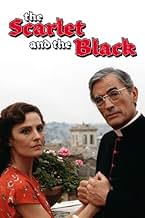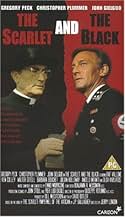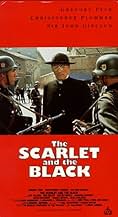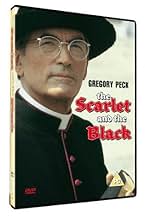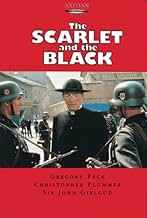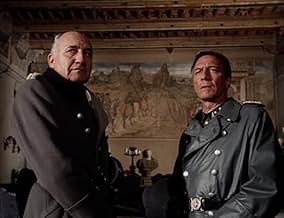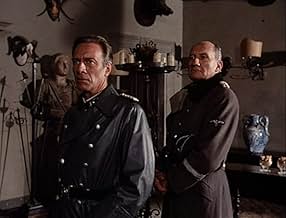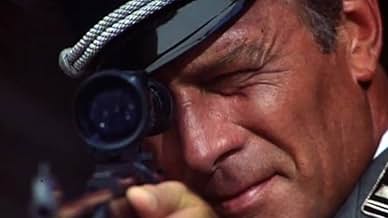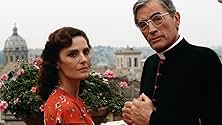Agrega una trama en tu idiomaVatican efforts, led by Monsignor Hugh O'Flaherty, to save Allied P.O.W.s and downed Allied airmen as the Nazis invade Rome.Vatican efforts, led by Monsignor Hugh O'Flaherty, to save Allied P.O.W.s and downed Allied airmen as the Nazis invade Rome.Vatican efforts, led by Monsignor Hugh O'Flaherty, to save Allied P.O.W.s and downed Allied airmen as the Nazis invade Rome.
- Dirección
- Guionistas
- Elenco
- Ganó 1 premio Primetime Emmy
- 1 premio ganado y 2 nominaciones en total
- Pope Pius XII
- (as Sir John Gielgud)
- Capt. Hirsch
- (as Ken Colley)
- Dirección
- Guionistas
- Todo el elenco y el equipo
- Producción, taquilla y más en IMDbPro
Opiniones destacadas
Col Kappler, a Nazi is in charge of the base in Rome. He commands his men to put a white painted line near the Vatican where those in the Vatican have to stay behind the line and supposedly his soldiers won't cross it.
Gregory Peck plays a Irish Catholic priest who plays Monsignor Hugh O'Flaherty. He heads a group of people in Italy that hide people in safe houses from the Nazis. Kappler has the priest followed everywhere to see who his friends are and who is hiding the people. O'Flaherty is aware of this and out smarts the soldiers and dresses up in different disguises to meet those in charge of his group.
Col Kappler despises O'Flaherty because the priest defies him in many ways. Kappler has a wife and two kids that live in Rome and are very spoiled. They are the only people Kappler cares about plus getting praised for his military successes.
Kappler and his soldiers have to leave Rome. There are soldiers coming in to get them out. He has failed and wants O'Flaherty to get his family out. Kappler talks about forgiveness and what the priest believes but the priest does not buy his attempts to get him to save his wife and children and tells him off.
This is a very serious part. Gregory Peck plays a man of strength through God, bravery in really tough times, trustworthy, faithful and full of love for his fellow man.
You have to watch it yourself. The end is very good and has some surprising results.
This story is inspired on actual facts and based on the nonfiction novel titled ¨The Scarlet Pimpernel of the Vatican¨ by J.P.Gallaher. This interesting story drags in some place but is well realized and contains good cinematography by Giuseppe Rotunno and excellent musical score by Ennio Morricone. It's a lavish production by Bill McCutchen , an ITC-RAI Radiotelevisione Italiana Co-production for world distribution, well filmed by Jerry London entirely on location in Rome.
The real events are the following : In the early years of World War II, O'Flaherty (Gregory Peck)toured prisoner of war camps in Italy and tried to find out about prisoners who had been reported missing in action.When Italy changed sides in 1943, thousands of British POWs were released. Some of them (John Terry), remembering visits by O'Flaherty , reached Rome and asked him for help. O'Flaherty did not wait for permission from his superiors. He recruited the help of other priests (Raf Vallone, Angelo Infanti), and a Swiss count (Vernon Dobtcheff). He also kept contact with Sir D'Arcy Osborne (Peter Burton), British Ambassador to the Vatican. O'Flaherty and his allies concealed 4,000 escapees − Allied soldiers and Jews − in flats, farms and convents. One of the hideouts was beside the local SS headquarters. O'Flaherty coordinated all this and when he was visiting outside the Vatican, he wore various disguises.The German occupiers of Rome commanded by Col. Herbert Kappler (Christopher Plummer) under orders of Reichsfuhrer Heinrich Himmler (T. P. McKenna) tried to stop him and eventually they found out that the leader of the network was a priest.His efforts put him at odds with the Pope Pius XII (John Gielgud) and SS attempts to assassinate him failed. They found out his identity, but could not arrest him inside the Vatican. When the German ambassador revealed this to O'Flaherty, he began to meet his contacts on the stairs of the St. Peter's Basilica.Several others, including priests, nuns and lay people, worked in secret with Msgr. O'Flaherty, and even hid refugees in their own private homes around Rome. Another person who contributed significantly to this operation was the Malta-born widow Chetta Chevalier (Olga Karlatos), who hid some refugees in her house with her sons (Fabiana Udenio), and was lucky to escape detection. When the Allies arrived in Rome in June 1944, 3,925 of the escapees were still alive. O'Flaherty demanded that German prisoners be treated properly as well. He took a plane to South Africa to meet Italian POWs and to Jerusalem to visit Jewish refugees. Of the 9,700 Jews in Rome, 1,007 had been shipped to Auschwitz. The rest were hidden, 5,000 of them by the official Church − 3,000 in Castel Gandolfo, 200 or 400 as "members" of the Palatine Guard and some 1,500 in monasteries, convents and colleges. The remaining 3,700 were hidden in private homes. After liberation Monsignor O'Flaherty was honored by Italy, Canada and Australia given the US medal of Freedom and made a Commander of the British Empire. Herbert Kappler was sentenced to life imprisonment for war crimes. In the long years that followed in his Italian prison, Kappler had only one visitor. Every month, year in and year out, O'Flaherty came to see him. In 1959, the former head of the dreaded Gestapo in Rome was baptized into the Catholic faith at the hand of the Irish priest.
The book is entitled "The Scarlet Pimpernel of the Vatican," by J. P. Gallagher. It is the story of Irish Monsignor Hugh O'Flaherty who was a minor Vatican official during World War II. Right under the noses of Vatican officials who looked the other way, and the German army, he helped smuggle allied soldiers out of Rome to safety in the months before the liberation of Rome. Rome and the Vatican were supposed to be neutral; if the Germans found out that the monsignor was helping the allies, who knows what would have happened.
I was able to find a copy of the book several years ago but have lost it. I do recall though that it had even more incredible stories about how O'Flaherty helped allied soldiers. One of the best (that is not in the movie) was about one American soldier whose appendix burst and he needed it removed. O'Flaherty dressed him as a German soldier, called the German army, they came and took him to their hospital - and O'Flaherty managed to get the soldier out before he even woke up because of the general confusion in the military hospital.
The Scarlett Pimpernel reference, is of course, to the British spy who helped save people from being beheaded during the French Revolution. That's another good book and the movie, with Anthony Andrews and Jane Seymour, are both excellent (though the movie changed the ending...).
There is talk today of making John Paul 11 a Saint. Surely somebody at the Vatican will remember this humble Monsignor who did (at the time) more to help mankind than anyone is such horrific circumstances. When I can afford it, I will visit this man's grave and say a silent prayer. I don't want a TV film crew there, but I want to say "Thank You" to a man who gave his all to save the free world! A certain telephone company ran a series of advertisements many years ago, asking who in History would you most like to talk to. For me... it would be Mons. Hugh O'Flaherty. At the moment in time, only this film, an area of trees and a gravestone honour this man. Surely he deserves more? An outstanding film, well cast, excellently photographed. Tension, intrigue, drama, even humour (dressing up as a Nun?) I say everyone should view this film. An inspiring, true life film.
This is the true story of a man whose conscience will not let him stand by while the world goes to hell around him. Gregory Peck plays an O'Flaherty whose quaint 'Oirish' charm hides a cunning and resourceful leader who has to balance the demands of his conscience with his role as an official in the Vatican government.
Pope Pius makes it clear he understands O'Flaherty's motivation while warning him that if he is arrested, the Pope will not compromise Vatican neutrality to save him. The film does its best to restore Pius XII's reputation - he has been called "Hitler's Pope" - but it is unclear how much he knew of, or even condoned, O'Flaherty's activities. O'Flaherty cannot compromise, and continues with his work despite the Gestapo having orders to shoot him on sight if he is found outside the Vatican, and suffering a failed assassination attempt in St Peter's itself.
Christopher Plummer is always worth watching and his performance here is no exception. Shown first as an arrogant man who feels the Nazis now "own Rome... it's ours", we later see that Kappler is at the mercy of this ruthless regime even as he plays his part in it. Finally the only person he can turn to is his arch-enemy from the Vatican. This is a fairly conventional irony, but during the course of the film Plummer also suggests how Kappler is losing his soul to his inhuman work, becoming isolated from his family as he begins to loathe what he is doing. You feel Kappler hates O'Flaherty not simply because of what he does, but because O'Flaherty represents the better part of himself.
I would give the film more stars but it is about 15 minutes too long and becomes rather episodic towards the end. However, it's a great story, well-acted by a strong cast, and can be viewed and enjoyed many times.
¿Sabías que…?
- TriviaWhile serving his sentence in prison, Herbert Kappler divorced his first wife and married his nurse, Anneliese, in 1972. In 1975, he was diagnosed with cancer. As the authorities refused to release him, in 1977, Anneliese carried Kappler out of prison in a large suitcase (he weighed less than one hundred five pounds at the time). They escaped to West Germany, where Kappler died six months later.
- ErroresIn at least four scenes, Herbert Kappler wears a black SS parade tunic instead of his usual office gray uniform. By 1943, when the film is set, the SS had completely phased the black SS tunic out of service and this uniform would not have been worn at even the most formal of functions.
- Citas
Col. Herbert Kappler: You're alone?
Monsignor Hugh O'Flaherty: I am.
Col. Herbert Kappler: Not afraid I'll shoot you?
Monsignor Hugh O'Flaherty: No. If you were going to kill me, your man would have already done it in my room.
Col. Herbert Kappler: That is so.
[pause]
Col. Herbert Kappler: But believe me, at this moment, nothing would give me greater pleasure.
Monsignor Hugh O'Flaherty: Well, when it comes down to it, a bullet's your answer to just about everything, isn't it? The only argument you've got.
- Versiones alternativasAn edited version of approximately 110 minutes (120 minutes when broadcast with adverts) is sometimes shown on TV in the UK.
- ConexionesReferences Rappresaglia (1973)
- Bandas sonorasLa Boheme
Composed by Giacomo Puccini
Selecciones populares
Detalles
- Fecha de lanzamiento
- Países de origen
- Idiomas
- También se conoce como
- Grimizno i crno
- Locaciones de filmación
- Productoras
- Ver más créditos de la compañía en IMDbPro
Contribuir a esta página


